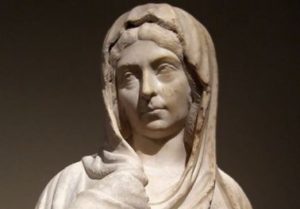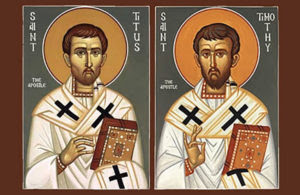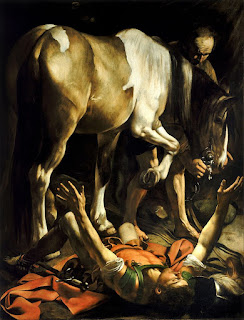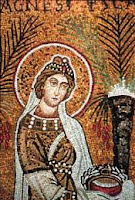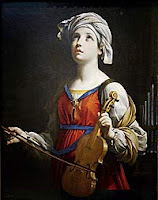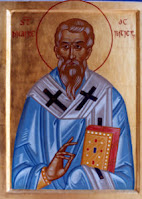Monday, January 31, 2022
Marcella of Rome
The Collect:
O God, who satisfies the longing soul and fills the hungry with good things: Grant that we, like your servant Marcella, may hunger and thirst after you above the vain pomp and glory of the world, and delight in your word above all manner of riches; through Jesus Christ our Lord, who lives and reigns with you and the Holy Spirit, one God, now and for ever. Amen.
Marcella (325–410) is known primarily for her role in the founding of monasticism. After the death of her husband, she commenced a life of abstinence and many other women in Rome at the time followed suit.
Growing up in Rome, Marcella was influenced by her pious mother, Albina, an educated woman of wealth and benevolence.
Marcella's wealth and beauty placed her at the center of fashionable Roman society. She married young, to a wealthy aristocrat, but seven months later he died. After her husband's early death, Marcella decided to devote the rest of her life to charity, prayer, and mortification of the flesh and was convinced that God was directing her to a life of poverty and service. She left behind her fashionable dresses for a coarse brown garment and abandoned her usual extravagant hair styling and makeup. Along with other women, Marcella formed a community known as the brown dress society, spending their time praying, singing, reading the Bible, and serving the needy. Her palatial home became a refuge for weary pilgrims and for the poor.
Summoned by Pope Damasus I (who arranged lodging at Marcella's hospitality house), Jerome arrived in Rome in 382. It was an exhilarating time for Marcella, a woman of letters who had immersed herself in both Greek and Hebrew, to be entertaining one of the great minds of the age. Jerome spent the next three years in what he called her "domestic church," translating the Bible into Latin. She learned under his teaching even as she critiqued his translation. He spoke and wrote of her Christian devotion and scholarship Indeed, his admiration of Marcella was unbounded, not only for her intellectual acumen but also for her deference to men who might be threatened by her vast store of knowledge.
Most of what we know about Marcella is from the letters of Jerome, most famously his letter 127 to Principia. It was written on the occasion of Marcella's death, paying tribute to her life and consoling her beloved student. *
* The Lectionary, Wikipedia, http://satucket.com/lectionary/Marcella_Rome.html
Saturday, January 29, 2022
Friday, January 28, 2022
Holy Eucharist & Annual Meeting - This Sunday
Sunday, January 30, 2022
Join us for “at church” or “virtually” for worship this Sunday, January 30, The Fourth Sunday after the Epiphany, at St. Alban’s, St. Thomas’, St. Patrick’s, and Iglesia Episcopal La Esperanza de Familias Unidas. Remember - Masks are optional, and communion will be offered in both kinds- wine by intinction. We strongly urge everyone to get vaccinated. Please maintain social distance in non-family groups.
Holy Eucharist, Rite Two
St. Alban’s - 8:30 a.m. and 10:30 a.m.* Followed by Annual Meeting
St. Thomas' - 10:00 a.m.*
St. Patrick’s – 11:00 a.m.*
La Santa Eucaristía: Rito Dos en la iglesia (primer y tercer domingo del mes y transmitido en vivo en Facebook) o Oración de la tarde diaria a través de Zoom (los otros domingos del mes)
Iglesia Episcopal La Esperanza de Familias Unidas – Domingo - 5:00 p.m.
Oración Vespertina Diaria a través de Zoom - Únete aqui
https://us02web.zoom.us/j/89906444437?pwd=bmdXYW9kNjVicVJHU3Fkb3BrMitKZz09
ID de reunión: 899 0644 4437
Contraseña: 500
o llame al +1 312 626 6799 or +1 346 248 7799
Zoom Compline - All Welcome
Sunday - 8:00 p.m.
Join Zoom Meeting
https://us02web.zoom.us/j/83861688528?pwd=WFdBcndxV3hzbUpETDNTSFFzc3Z0QT09
Meeting ID: 838 6168 8528
Passcode: 800
or dial in at +1 312 626 6799 or +1 346 248 7799
We hope to “see” you all on Sunday as you are most comfortable!
Rita+, Rob+ and Whit+
Art from Clip Art, Steve Erspamer, Liturgy Training Publications – ltp.org
Thomas Aquinas
Thomas Aquinas, Friar and Theologian, 1274
The Collect:
Almighty God, who has enriched your church with the singular learning and holiness of your servant Thomas Aquinas: Enlighten us more and more, we pray, by the disciplined thinking and teaching of Christian scholars, and deepen our devotion by the example of saintly lives; through Jesus Christ our Lord, who lives and reigns with you and the Holy Spirit, one God, for ever and ever. Amen.
In the thirteenth century, when Thomas Aquinas lived, the works of Aristotle, largely forgotten in Western Europe, began to be available again, partly from Eastern European sources and partly from Moslem Arab sources in Africa and Spain. These works offered a new and exciting way of looking at the world. Many enthusiastic students of Aristotle adopted him quite frankly as as an alternative to Christianity. The response of many Christians was to denounce Aristotle as an enemy of the Christian Faith. A third approach was that of those who tried to hold both Christian and Aristotelian views side by side with no attempt to reconcile the two. Aquinas had a fourth approach. While remaining a Christian, he immersed himself in the ideas of Aristotle, and then undertook to explain Christian ideas and beliefs in language that would make sense to disciples of Aristotle. At the time, this seemed like a very dangerous and radical idea, and Aquinas spent much of his life living on the edge of ecclesiastical approval. His success can be measured by the prevalence today of the notion that of course all Christian scholars in the Middle Ages were followers of Aristotle.Aristotle is no longer the latest intellectual fashion, but Aquinas's insistence that the Christian scholar must be prepared to meet other scholars on their own ground, to become familiar with their viewpoints, to argue from their premises, has been a permanent and valuable contribution to Christian thought. *
* The Lectionary, James Kiefer, http://www.satucket.com/lectionary/Thomas_Aquinas.htm
Thursday, January 27, 2022
Golden Mouth
John Chrysostom, Bishop and Theologian, 407
The Collect:O God, who gave your servant John Chrysostom grace eloquently to proclaim your righteousness in the great congregation, and fearlessly to bear reproach for the honor of your Name: mercifully grant to all who proclaim your word such excellence in preaching, that all your people may be made partakers of the glory that shall be revealed; through Jesus Christ our Lord, who lives and reigns with you and the Holy Spirit, one God for ever and ever. Amen.
John was called "Chrysostom" ("Golden Mouth") because of his eloquence. He was a priest of Antioch, and an outstanding preacher. (Audiences were warned not to carry large sums of money when they went to hear him speak, since pickpockets found it very easy to rob his hearers -- they were too intent on his words to notice what was happening.) His sermons are mostly straightforward expositions of Holy Scripture (he has extensive commentaries on both Testaments, with special attention to the Epistles of Paul), and he emphasizes the literal meaning, whereas the style popular at Alexandria tended to read allegorical meanings into the text. He loved the city and people of Antioch, and they loved him. However, he became so famous that the Empress at Constantinople decided that she must have him for her court preacher, and she had him kidnapped and brought to Constantinople and there made bishop. This was a failure all around. His sermons against corruption in high places earned him powerful enemies (including the Empress), and he was sent into exile, where he died. Along with Athanasius of Alexandria, Basil the Great, and Gregory of Nazianzus, he is counted as one of the Four Great Eastern (or Greek) Doctors of the Ancient Church. The Four Great Western (or Latin) Doctors are Ambrose, Jerome, Augustine, and Gregory the Great. *
* The Lectionary, James Kiefer, http://www.satucket.com/lectionary/John_Chrysostom.htm
Wednesday, January 26, 2022
Titus and Timothy
Titus and Timothy, Companions of Saint Paul
The Collect:
Almighty God, who called Timothy and Titus to be evangelists and teachers, and made them strong to endure hardship: Strengthen us to stand fast in adversity, and to live godly and righteous lives in this present time, that with sure confidence we may look for our blessed hope, the glorious appearing of our great God and Savior Jesus Christ; who lives and reigns with you and the Holy Spirit, one God, now and for ever. Amen.
Timothy and Titus appear in the New Testament writings as missionary companions of, and co-workers with, the Apostle Paul. Titus is mentioned as a companion of Paul in some of his epistles (2 Co 2:13; 7:6,13,14; 8:6,16,23; 12:18; Gal 2:1-3; 2 Tim 4:10). Timothy is mentioned in Acts 16-20, and appears in 9 epistles either as joining in Paul's greetings or as a messenger. In addition, Timothy has two New Testament letters addressed to him, and Titus one. From these three letters (called the Pastoral Epistles), it appears that Paul had commissioned Timothy to oversee the Christian community in Ephesus and vicinity, and Titus to oversee that in Crete. *
* The Lectionary, James Kiefer, http://www.satucket.com/lectionary/Timothy&Titus.htm
Join us on Zoom for Evening Prayer and our Video Study Class.
Wednesday, 5:30 p.m.
Meeting ID: 867 8157 7595
Passcode: 530
Dial by your location +1 312 626 6799 or +1 346 248 779
Tuesday, January 25, 2022
The Conversion of Saint Paul
The Conversion of Saint Paul the Apostle
The Collect:
O God, by the preaching of your apostle Paul you have caused the light of the Gospel to shine throughout the world: Grant, we pray, that we, having his wonderful conversion in remembrance, may show ourselves thankful to you by following his holy teaching; through Jesus Christ our Lord, who lives and reigns with you, in the unity of the Holy Spirit, one God, now and for ever. Amen.
On January 25 we remember how Saul (or Paul) of Tarsus, formerly an enemy and persecutor of the early Christian Church, was led by God's grace to become one of its chief spokesmen. Our chief sources of information about the Apostle Paul are several of his own letters, preserved for us in the New Testament, and the account of him given by Luke in the book of Acts. One of the readings appointed for this day is from St. Paul’s Letter to the Galatians (1:11-24).
For I want you to know, brothers and sisters, that the gospel that was proclaimed by me is not of human origin; for I did not receive it from a human source, nor was I taught it, but I received it through a revelation of Jesus Christ. You have heard, no doubt, of my earlier life in Judaism. I was violently persecuting the church of God and was trying to destroy it. I advanced in Judaism beyond many among my people of the same age, for I was far more zealous for the traditions of my ancestors. But when God, who had set me apart before I was born and called me through his grace, was pleased to reveal his Son to me, so that I might proclaim him among the Gentiles, I did not confer with any human being, nor did I go up to Jerusalem to those who were already apostles before me, but I went away at once into Arabia, and afterwards I returned to Damascus. Then after three years I did go up to Jerusalem to visit Cephas and stayed with him fifteen days; but I did not see any other apostle except James the Lord’s brother. In what I am writing to you, before God, I do not lie! Then I went into the regions of Syria and Cilicia, and I was still unknown by sight to the churches of Judea that are in Christ; they only heard it said, “The one who formerly was persecuting us is now proclaiming the faith he once tried to destroy.” And they glorified God because of me.
Note: The art used is The Conversion of Saint Paul, a painting by Caravaggio, a leading Italian painter of the late 16th and early 17th centuries who became famous for the intense and unsettling realism of his large-scale religious works. Many depictions of Paul's conversion feature a horse, a detail not mentioned in the Biblical accounts. ;-)
Monday, January 24, 2022
Florence Li Tim-Oi
Florence Li Tim-Oi, Priest, 1992
The Collect:
Almighty God, who pours out your Spirit upon your sons and daughters: Grant that we, following the example of your servant Florence Li Tim-Oi, chosen priest in your church, may with faithfulness, patience, and tenacity proclaim your holy gospel to all the nations, through Jesus Christ our Lord, who lives and reigns with you and the Holy Spirit, one God, in glory everlasting. Amen.
Florence Li Tim-Oi (5 May 1907 – 26 February 1992 ) was the first woman to be ordained to the priesthood in the Anglican Communion on 25 January 1944.
Florence Li, born in Hong Kong, attended Canton Union Theological College to receive her theological education before returning to Hong Kong in 1938. After working for two years in All Saints Church, in Kowloon, helping refugees in Hong Kong who fled mainland China in the midst of the Second Sino-Japanese War, Li was sent by Bishop Ronald Hall to help with refugees in Macau. Six months into her new post, she returned to Hong Kong to be ordained as a deaconess on 22 May 1941 by Bishop Hall.
The Japanese occupation of Hong Kong and of parts of China had made it impossible for Anglican priests to get to neutral Macau, where there was no resident Anglican priest. In January 1944, Li traveled through Japanese-occupied territory to the small town of Hsinxing, as yet unoccupied by the Japanese, to meet with Bishop Hall; from there they proceeded to Shaoqing where he regularized her administration of the sacraments by ordaining her as a priest on 25 January 1944. It was to be 30 years before any Anglican church regularized the ordination of women, so unsurprisingly after the war there were protests concerning her ordination; to avoid further controversy she resigned her license, though not her priest's orders.
She later moved to Canada where she was eventually able to exercise her role as a priest. *
* The Lectionary via Wikipedia, http://www.satucket.com/lectionary/Li_Tim-Oi.htm
Saturday, January 22, 2022
Friday, January 21, 2022
Sunday, January 23
Join us for “at church” or “virtually” for worship this Sunday, January 23, The Third Sunday after the Epiphany, at St. Alban’s, St. Thomas’, St. Patrick’s, and Iglesia Episcopal La Esperanza de Familias Unidas. Remember - Masks are optional, and communion will be offered in both kinds- wine by intinction. We strongly urge everyone to get vaccinated. Please maintain social distance in non-family groups.
Holy Eucharist, Rite Two
St. Alban’s - 8:30 a.m. and 10:30 a.m.*
St. Thomas' - 10:00 a.m.*
St. Patrick’s – 11:00 a.m.*
* These liturgies will be Live-Streamed on Facebook for those who choose to remain at home. Download a pdf of the leaflet to print or to use on your phone or tablet with this link - https://drive.google.com/file/d/1FFzA4n20bPOkaGFWcMRTjsXylNqd-8hW/view?usp=sharing
La Santa Eucaristía: Rito Dos en la iglesia (primer y tercer domingo del mes y transmitido en vivo en Facebook) o Oración de la tarde diaria a través de Zoom (los otros domingos del mes)
Iglesia Episcopal La Esperanza de Familias Unidas – Domingo - 5:00 p.m.
Oración Vespertina Diaria a través de Zoom - Únete aqui
https://us02web.zoom.us/j/89906444437?pwd=bmdXYW9kNjVicVJHU3Fkb3BrMitKZz09
ID de reunión: 899 0644 4437
Contraseña: 500
o llame al +1 312 626 6799 or +1 346 248 7799
Zoom Compline - All Welcome
Sunday - 8:00 p.m.
Join Zoom Meeting
https://us02web.zoom.us/j/83861688528?pwd=WFdBcndxV3hzbUpETDNTSFFzc3Z0QT09
Meeting ID: 838 6168 8528
Passcode: 800
or dial in at +1 312 626 6799 or +1 346 248 7799
We hope to “see” you all on Sunday as you are most comfortable!
Rita+, Rob+ and Whit+
Art from Clip Art, Steve Erspamer, Liturgy Training Publications – ltp.org
Agnes and Cecilia
Agnes and Cecilia of Rome
The Collect:
Almighty and everlasting God, who chooses those whom the world deems powerless to put the powerful to shame, grant us so to cherish the memory of your youthful martyrs Agnes and Cecilia, that we might share their pure and steadfast faith in you; through Jesus Christ our Lord, who lives and reigns with you and the Holy Spirit, one God for ever and ever. Amen.
Agnes is a Christian martyr who died at Rome around 304 in the persecution of Diocletian: the last and fiercest of the persecutions of Christianity by the Roman emperors. The anniversary of her martyrdom is observed on 21 January. Her name means “pure” in Greek and “lamb” in Latin. She is said to have been only about twelve or thirteen when she died, and the remains preserved in St Agnes' Church in Rome are in agreement with this. It is said that her execution shocked many Romans and helped bring an end to the persecutions. Agnes is regarded as the patron of young unmarried girls, and there is a folk-belief that a girl who goes to bed supperless on the eve of St Agnes's Day will dream that night about her husband-to-be.
Cecilia is the patron saint of musicians and Church music because as she was dying she sang to God. It was long supposed that she was a noble lady of Rome who, with her husband Valerian, his brother Tiburtius, and a Roman soldier Maximus, suffered martyrdom, c. 230, under the Emperor Alexander Severus. It is said of the martyrdom of Cecilia that the officials attempted to kill her by boiling her alive. However, the attempt failed, and she was to be beheaded. The executioner attempted to decapitate her three times unsuccessfully, at which time he fled. Cecilia survived another three days before succumbing. In the last three days of her life, she opened her eyes, gazed at her family and friends who crowded around her cell, closed them, and never opened them again. The people by her cell knew immediately that she was to become a saint in heaven. *
* The Lectionary, James Kiefer - http://www.satucket.com/lectionary/Agnes.htm & The Lectionary via Wikipedia - http://www.satucket.com/lectionary/cecilia.htm
Thursday, January 20, 2022
Wednesday, January 19, 2022
Wulfstan of Worcester
Wednesday, 5:30 p.m.
Passcode: 530
Dial by your location +1 312 626 6799 or +1 346 248 779
Wulfstan of Worcester, Bishop, 1095
The Collect:
Almighty God, your only-begotten Son led captivity captive and gave gifts to your people: Multiply among us faithful pastors, who, like your holy bishop Wulfstan, will give courage to those who are oppressed and held in bondage; and bring us all, we pray, into the true freedom of your kingdom; through Jesus Christ our Lord, who lives and reigns with you and the Holy Spirit, one God, for ever and ever. Amen.
When William the Norman conquered England in 1066, he replaced most of the native Anglo-Saxon bishops with clergy from his own Normandy. The most conspicuous exception was Wulfstan, Bishop of Worcester (pronounced "Wooster"), who had been a supporter of the Anglo-Saxon King Harold, but who submitted to William after Harold's death, and became one of the King's most trusted advisors. He is best remembered for his opposition to the slave trade in western England. *
* The Lectionary, James Kiefer, http://www.satucket.com/lectionary/Wulfstan.htmTuesday, January 18, 2022
The Confession of Saint Peter the Apostle
The Confession of Saint Peter the Apostle
The Collect:
Almighty Father, who inspired Simon Peter, first among the apostles, to confess Jesus as Messiah and Son of the living God: Keep your Church steadfast upon the rock of this faith, so that in unity and peace we may proclaim the one truth and follow the one Lord, our Savior Jesus Christ; who lives and reigns with you and the Holy Spirit, one God, now and for ever. Amen.
On January, each year, the Church remembers how the Apostle Peter was led by God's grace to acknowledge Jesus as the Christ (Matthew 16:13-20 - see below), and we join with Peter, and with all Christians everywhere, in hailing Jesus as our Lord, God, and Savior. *
The Lectionary (modified), James Kiefer, http://www.satucket.com/lectionary/Confession_Peter.htm
Matthew 16:13-19
Now when Jesus came into the district of Caesarea Philippi, he asked his disciples, “Who do people say that the Son of Man is?” And they said, “Some say John the Baptist, but others Elijah, and still others Jeremiah or one of the prophets.” He said to them, “But who do you say that I am?” Simon Peter answered, “You are the Messiah, the Son of the living God.” And Jesus answered him, “Blessed are you, Simon son of Jonah! For flesh and blood has not revealed this to you, but my Father in heaven. And I tell you, you are Peter, and on this rock I will build my church, and the gates of Hades will not prevail against it. I will give you the keys of the kingdom of heaven, and whatever you bind on earth will be bound in heaven, and whatever you loose on earth will be loosed in heaven.”
Art Note: This is a detailed portion of a marvelous painting - The Sacrament of Ordination is a portrait of Jesus handing the keys of the kingdom to St. Peter and the Apostles. It was one of an ambitious set of masterpieces Nicolas Poussin painted in the 1630s. It is housed at the Kimbell Art Museum.
Monday, January 17, 2022
MLK Day
Loving is the most difficult command Jesus gives us, and the one that really changes the world.
Today is the Martin Luther King, Jr. Holiday. The Church remembers King as a pastor and martyr on his birthday, January 15 or on the day of his assassination, April 4.
One of the readings for his remembrance is from the Gospel of Luke.
Jesus said, “I say to you that listen, Love your enemies, do good to those who hate you, bless those who curse you, pray for those who abuse you. If anyone strikes you on the cheek, offer the other also; and from anyone who takes away your coat do not withhold even your shirt. Give to everyone who begs from you; and if anyone takes away your goods, do not ask for them again. Do to others as you would have them do to you.”
“If you love those who love you, what credit is that to you? For even sinners love those who love them. If you do good to those who do good to you, what credit is that to you? For even sinners do the same. If you lend to those from whom you hope to receive, what credit is that to you? Even sinners lend to sinners, to receive as much again. But love your enemies, do good, and lend, expecting nothing in return. Your reward will be great, and you will be children of the Most High; for he is kind to the ungrateful and the wicked. Be merciful, just as your Father is merciful.” Luke 6:27–36
The Collect
Saturday, January 15, 2022
Friday, January 14, 2022
The Second Sunday after the Epiphany
Sunday, January 16, 2022
Join us for “at church” or “virtually” for worship this Sunday, January 16, The Second Sunday after the Epiphany, at St. Alban’s, St. Thomas’, St. Patrick’s, and Iglesia Episcopal La Esperanza de Familias Unidas. Remember - Masks are optional, and communion will be offered in both kinds- wine by intinction. We strongly urge everyone to get vaccinated. Please maintain social distance in non-family groups.
St. Alban’s - 8:30 a.m. and 10:30 a.m.*
St. Thomas' - 10:00 a.m.*
St. Patrick’s – 11:00 a.m.*
La Santa Eucaristía: Rito Dos en la iglesia (primer y tercer domingo del mes y transmitido en vivo en Facebook) o Oración de la tarde diaria a través de Zoom (los otros domingos del mes)
Iglesia Episcopal La Esperanza de Familias Unidas – Domingo - 5:00 p.m.
Hoy - La Santa Eucaristía: Rito Dos
Zoom Compline - All Welcome
Sunday - 8:00 p.m.
Join Zoom Meeting
https://us02web.zoom.us/j/83861688528?pwd=WFdBcndxV3hzbUpETDNTSFFzc3Z0QT09
Passcode: 800
or dial in at +1 312 626 6799 or +1 346 248 7799
Thursday, January 13, 2022
Hilary
Hilary of Poitiers, Bishop, 367
The Collect:
Keep us steadfast, Lord God, in that true faith that we professed at our baptism; that, like your servant Hilary of Poitiers, we may rejoice in having you for our Father, and may abide in your Son, in the fellowship of the Holy Spirit; for you live and reign for ever and ever as one God in Trinity of Persons. Amen.
Hilary of Poitiers (315-367) lived during the great controversy between Athanasius, who taught that the Son is fully God, equally with the Father, and Arius, who denied this.
Hilary is sometimes called "the Athanasius of the West." He was bishop of Poitiers, and when he refused to sign a condemnation of Athanasius, the Arian emperor Constantius (one of the sons of Constantine) banished him to Phrygia in 357. His exile lasted three years, during which time he wrote several essays, including On the Trinity. Finally the Emperor was forced to send him back to Gaul because he was causing such difficulties for the Arians in the East. In 364, he journeyed to Milan, where he engaged in public debate with the Arian bishop Auxentius, and persuaded him of the error of his ways. *
* The Lectionary, James Kiefer, http://satucket.com/lectionary/Hilary.htm
Wednesday, January 12, 2022
Tonight
Evening Prayer and Study of Aelred - Tonight via Zoom
Join us tonight - Wednesday night, January 12, for Evening Prayer and our Study of Aelred Class.
Zoom Evening Prayer & Aelred Class
Wednesday, 5:30 p.m.
Join Zoom Meeting
https://us02web.zoom.us/j/86781577595?pwd=VjNnZTZnUFFadkJPc3VOVTh3K21Idz09
Meeting ID: 867 8157 7595
Passcode: 530
Dial by your location +1 312 626 6799 or +1 346 248 779
More information about Aelred follows...
Aelred of Rievaulx, Abbot and Theologian, 1167
The Collect:
Grant to your people, Almighty God, a spirit of mutual affection, that following the example of your servant Aelred, we might know the love of Christ in loving one another, and might rejoice in the gift of your eternal goodness; through the same Jesus Christ our Lord, who lives and reigns with you and the Holy Spirit, one God, now and for ever. Amen.
Aelred was born in 1109 at Durham, and was sent to the Scottish court for an education that would ensure his future as a noble and courtier. He succeeded, to the extent of being made Master of the Household of the King of Scotland. Nevertheless, he found success at the court of an earthly king unsatisfying, and at the age of 24 he entered the Cistercian monastery at Rievaulx in Yorkshire. Bernard of Clairvaux encouraged him to write his first work, The Mirror of Charity, which deals with seeking to follow the example of Christ in all things. In 1147 he became abbot of Rievaulx, a post which he held until his death of kidney disease twenty years later at the age of 57.
His most famous work is called Spiritual Friendship (both it and the Mirror have been published in English by the Cistercian Press).
When Jesus was told that his family was waiting to see him, he replied, "All who do the will of my Father are my family." From this, some Christians have drawn the conclusion that the only kind of love permissible to a Christian is Charity -- that is: (a) the universal benevolence that wills the good of all persons, and (b) the bond that unites the Christian with Christ and through Christ with all other Christians. Note that Universal Benevolence is extended equally to all persons (we are to love Jones because God made him), and that the bond of Christian Unity unites us equally with all our fellow Christians who are in a state of grace (we are to love Jones because Christ dwells in him). Neither leaves any room for particular friendships, for liking Jones more than Smith because Jones shares our interest in hockey, or because Jones and we like the same sort of jokes, or come from the same part of the country and have similar childhood memories, or because Jones is an easy-going type and it is easy to relax and feel comfortable around him, or because Jones and we have a special bond of friendship, loyalty, and trust. Particular friendships are out!
Some who do not think that every Christian must renounce particular friendships believe that every monastic must do so. In many religious houses, where the monks or nuns walk two by two into chapel or the dining hall or while pacing about during the daily hour of recreation, the superior will make a point of constantly shifting partners, lest anyone form a liking for one partner more than another. (This does not apply just to friends. It is sometimes held that no monk ought to allow himself any preferences in food or drink.) Against this view, Aelred wrote that it is compatible with the highest degree of Christian perfection to take special pleasure in the company of particular friends. He point out that we are told that Jesus loved John, and Mary, and Martha, and Lazarus, and that this probably means that he found their company congenial. *
* The Lectionary, James Kiefer, http://www.satucket.com/lectionary/Aelred.htm
Tuesday, January 11, 2022
Epiphany
Epiphany is a Greek word meaning “manifestation, showing forth, revelation.” This feast proclaims our faith that in Jesus, God is revealed to all people — not just to an inner circle or a chosen few, but to all people, in all places, and throughout all time. Christians believe that in the person of Jesus we see who God is, and in the words and actions of Jesus we see God at work in the world. Epiphany marks a series of occasions at which Jesus was revealed to be God’s Son.
The feast of Epiphany and the weeks that follow are a time when we reflect on several “manifestations” of Jesus, as he was recognized as the Messiah (or Christ) by many different people. We hear about Jesus’ baptism in the river Jordan by John the Baptist and the visit of the magi, or wise men, who followed the star to Bethlehem at Jesus’ birth. We share the amazement of the guests at the wedding party at Cana as Jesus performs his first miracle by turning water into fine wine. And at the end of the season we see Jesus’ glory shown to three of his disciples on the mountain as he is transfigured before them in a blaze of light.
Open: Arise, shine, for your light has come. And the glory of the Lord has dawned upon you.
Scripture: God said, “Let there be light,” and there was light. And God saw that the light was good. Genesis 1:3
Meditation: How will I invite God’s love to shine through me today?
Prayer: Brightest and best of the stars of the morning, Dawn on our darkness and lend us thine aid; Star of the east, the horizon adorning, Guide where the infant Redeemer is laid.
Close: Arise, shine, for your light has come. And the glory of the Lord has dawned upon you. *
* Daily Prayer for All Seasons, © 2014 The Domestic and Foreign Missionary Society of The Protestant Episcopal Church in the United States of America
Monday, January 10, 2022
William Laud
William Laud, Archbishop of Canterbury, 1645
The Collect:
Keep us, O Lord, constant in faith and zealous in witness, that, like your servant William Laud, we may live in your fear, die in your favor, and rest in your peace; for the sake of Jesus Christ your Son our Lord, who lives and reigns with you and the Holy Spirit, one God, for ever and ever. Amen.
William Laud, born in 1573, was Archbishop of Canterbury from 1633 to 1645 in the days of King Charles I. It was a turbulent time throughout, one of violent divisions in the Church of England, eventually culminating in the English Civil War.
An example is the surplice controversy. We have all encountered Christians who are opposed to celebrating Christmas on the grounds that (a) the Bible nowhere commands us to celebrate Christmas, and does not mention the 25th of December; and (b) the pagans had a festival in December at which they built fires and feasted and exchanged gifts, from which it follows that those who celebrate Christmas are participating in pagan rites. Similarly, in the late 1500's and early 1600's, there were Christians in England who objected to the garment called the surplice. When participating in the services of Morning and Evening Prayer in Church, clergy, including choir members, normally wore a cassock (a black, floor-length, fairly tight-fitting garment) covered by a surplice (a white, knee-length, fairly loose garment with loose sleeves). The Puritans objected to the surplice (a) as not mentioned in the Bible, and (b) as something that the Roman Catholics had worn before the Reformation, which made it one of the props of idolatrous worship, and marked anyone who wore it as an idolater. Archbishop Laud regarded it as a seemly, dignified, garment, an appropriate response to the Apostle Paul's injunction, "Let all things be done decently and in order." The Puritans stood by their objections, and violently interrupted services at which the surplice was worn. On one occasion, a group of Puritans broke into an Oxford chapel the night before a service and stole the surplices, which they thrust into a dung-pit of a privy. Again, a woman marched into Lichfield Cathedral, accompanied by the town clerk and his wife, and ruined the altar hangings with a bucket of pitch.
Under English Law, it was part of Laud's office as Archbishop to maintain order and to punish offences against the peace of the Church. He made it his practice to proceed not only against poor and obscure offenders, but also, perhaps especially, against rich and powerful ones. It is well that men should be equal before the law, but his integrity on this point ultimately cost Laud his life.
Laud was also the prosecutor of record in the trials of those who published seditious or violent and abusive attacks on the doctrine and discipline of the Church, and the Puritans produced an abundance of scurrilous attacks on those who disagreed with them, which were duly punished, with Laud taking the responsibility. In 1630 (before Laud became Archbishop), when Alexander Leighton published Zion's Pleas Against Prelacy, a violent attack on the Bishops as tools of Antichrist, he was sentenced to be publicly whipped and branded, and to have his ears cut off. He was sixty years old and a Doctor of Divinity, and the sentence aroused great public indignation. (It is not certain that it was actually carried out.)
Laud made enemies chiefly in three ways. (1) He punished those who attacked the Church, both those who vandalized and those who merely scolded. (2) He upheld various customs in public worship (such as the wearing of the surplice) that were harmless in themselves, but which aroused the suspicion and fury of those who feared a return to power of Roman Catholicism. (3) He sought the financial independence of the clergy, so that a preacher was not dependent on what support the local squire was pleased to give him. His proposed means to this end was to restore to the Church some of the Church lands that had been seized by Henry VIII and given or sold to various nobles and gentlemen. The proposal never reached the stage of discussion about details, so it was not clear how compensation would be handled, but the mere whisper of such a proposal was enough to make every landholder in the country feel personally threatened.
In 1637 an attempt was made to introduce The Book of Common Prayer into general use in Scotland, and it immediately caused rioting. In February of 1638, Scottish leaders signed the National Covenant, by which they pledged themselves to uphold the Puritan position by force, and by the end of the year they had voted to depose and excommunicate every bishop in Scotland. The unrest spread to England, and in 1640 Laud was arrested on a charge of high treason. He was kept in the Tower for four years, and tried in 1644, at the age of seventy-one. He was found guilty, not because there was any evidence of his guilt, but because the House of Commons was determined that he should die. On the scaffold he prayed: "The Lord receive my soul, and have mercy on me, and bless this kingdom with peace and charity, that there may not be this effusion of Christian blood amongst them." *
* The Lectionary, James Kiefer, http://satucket.com/lectionary/William_Laud.htm
Saturday, January 8, 2022
Worship This Sunday!
Sunday, January 9, 2022
Join us for “at church” or “virtually” for worship this Sunday, January 9, The First Sunday after the Epiphany: The Baptism of Our Lord Jesus Christ, at St. Alban’s, St. Thomas’, St. Patrick’s, and Iglesia Episcopal La Esperanza de Familias Unidas. Remember - Masks are optional, and communion will be offered in both kinds- wine by intinction. We strongly urge everyone to get vaccinated. Please maintain social distance in non-family groups.
St. Alban’s - 8:30 a.m. and 10:30 a.m.*
St. Thomas' - 10:00 a.m.*
St. Patrick’s – 11:00 a.m.*
La Santa Eucaristía: Rito Dos en la iglesia (primer y tercer domingo del mes y transmitido en vivo en Facebook) o Oración de la tarde diaria a través de Zoom (los otros domingos del mes)
Iglesia Episcopal La Esperanza de Familias Unidas – Domingo - 5:00 p.m.
Oración Vespertina Diaria a través de Zoom - Únete aqui
https://us02web.zoom.us/j/89906444437?pwd=bmdXYW9kNjVicVJHU3Fkb3BrMitKZz09
ID de reunión: 899 0644 4437
Contraseña: 500
o llame al +1 312 626 6799 or +1 346 248 7799
Zoom Compline - All Welcome
Sunday - 8:00 p.m.
Join Zoom Meeting
https://us02web.zoom.us/j/83861688528?pwd=WFdBcndxV3hzbUpETDNTSFFzc3Z0QT09 Meeting ID: 838 6168 8528
Passcode: 800
We hope to “see” you all on Sunday as you are most comfortable!
Rita+, Rob+ and Whit+
Art from Clip Art, Steve Erspamer, Liturgy Training Publications – ltp.org
Harriet Bedell
Harriet Bedell, Deaconness and Missionary, 1969
The Collect:
Holy God, fill us with compassion and respect for all people, and empower us for the work of ministry whether near or far away; that like thy servant Harriet Bedell, we may how forth your praise, not only with our lips, but in our lives. Through Jesus Christ our Lord, who lives and reigns with you and the Holy Spirit, one God, for ever and ever. Amen.
Harriet Bedell, missionary and friend to the Seminole Indians of Florida, was born in Buffalo, New York on March 19, 1875. She was trained as a schoolteacher but was inspired several years later by an Episcopalian missionary who spoke at her church describing the many needs of missionary work. In 1906 she applied to, and was accepted by, the New York Training School for Deaconesses, where her one-year course of study included instruction in religious matters, missions, teaching, hygiene, and hospital nursing. Following her training she was sent as a missionary-teacher to the Cheyenne Indians at Whirlwind Mission in Oklahoma.
Bedell's duties at the Whirlwind Mission were many. She cared for the sick and the poor, organized social services for the tribe, performed the duties of the rector in his absence, and provided education for the women and children. She provided religious instruction, hoping to win the confidence of the Indians and convert them to Christianity.
Because of her experience in both teaching and working with Indians, in 1916 an Episcopal bishop requested that she consider an assignment in a remote area of Alaska. Saddened by the prospect of leaving Oklahoma, she nevertheless accepted her new assignment in Stevens Village, Alaska. While there, in 1922 she was finally made a deaconess in the church, instilling in her a new and profound dedication to her vocation. The mission at Stevens Village was moved to Tanana so that a boarding school funded by church members' contributions could be established for the children who could not travel in the bad winter weather. However, by 1931, funds were so scarce that Deaconess Bedell traveled to New York to plea for more contributions. Because of the Great Depression, there was little available money, and although the church paid off the school's existing debt, there was little reason for Bedell to return to Alaska.
Through speaking engagements following her service in Alaska, Bedell was invited to visit a Seminole Indian reservation in southern Florida. Appalled by their living conditions, she began her campaign to improve the quality of life among the Mikasuki-Seminole Indians by living and working with them, not merely teaching them. She sought to revive the doll making and basket weaving skills which had become nearly extinct. She encouraged the incorporation of the intricate patchwork designs made by Indian women into articles of clothing for both women and men. Sales from the arts and crafts store at Blades Cross Mission helped to provide improved income for the Mikasuki-Seminoles.
Bedell emphasized health and education rather than religious conversion in her work with the Seminoles; their spiritual and physical comfort was more important to her than religious conversion, and her work and friendship with the Seminoles of Florida reflected those values.*
* Source: The Florida Memory Project, via The Lectionary, http://www.satucket.com/lectionary/Bedell.htm

